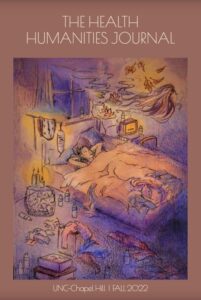By: Isabel Kakacek
The Health Humanities Journal (HHJ) of UNC-Chapel Hill hosted an Exhibition Night to celebrate the launch of their Fall 2022 issue on Monday, November 14th. Writers who had submitted their pieces, HHJ editorial staff, and other UNC community members gathered to listen to some authors read their works aloud and deliberate on the pieces during a science-fair-style Q&A session. The night was both educational and personal, presenting pieces that pulled on the heart strings and inspired important discussions regarding topics in the field of Health Humanities.

 Editor-in-Chief, Iris Kang (left), opened the event with the idea of conversation in mind. Exhibition nights in the past usually only contained readings from authors, but Kang wanted to change the structure to foreground discussion. She said that allowing time for people to converse about the pieces “could be a really powerful gift” to the journal.
Editor-in-Chief, Iris Kang (left), opened the event with the idea of conversation in mind. Exhibition nights in the past usually only contained readings from authors, but Kang wanted to change the structure to foreground discussion. She said that allowing time for people to converse about the pieces “could be a really powerful gift” to the journal.
“One of our big things we talk about is engagement in conversation,” agreed Miranda Almy (right), the Managing Editor of HHJ. Thanks to the help of editors Parker Savage and Kate Brown, the Journal has also launched a new podcast that aids in their overall goal of prioritizing conversation.
This edition of the Journal incorporated many stories surrounding mental health, and Kang hoped that providing a space for conversation, with the pieces and their authors, meant that the crowd could feel a certain resonance with the works–especially since mental health has become an increasingly relevant topic of conversation among modern society. Authors and editors together agreed that experiencing life during a pandemic negatively affected many people’s well-being. Some pieces, like “valēte (Pandemic Blues)” by Ariadne Tsoulouhas, spoke directly to the various emotions that many have and continue to experience in response to the COVID-19 virus. Others focused on personal experiences that had less to do with the pandemic and pertained more so to mental illness in general.
“Just Like Mom,” written by author A.H. Stepp, was the edition’s concluding piece and went into more detail. As stated by Stepp, “[he] wanted  people to see that they could connect” to his piece. His goal was to express his own experiences with mental health while telling a story that others might relate to, and therefore find some solace in.
people to see that they could connect” to his piece. His goal was to express his own experiences with mental health while telling a story that others might relate to, and therefore find some solace in.
Ash Chen, author of “Plath, and other Poems from the Psych Ward,” also used the Journal as a space to address mental health, saying that when it comes to submitting a story for publication, “it’s very vulnerable.” She also mentioned that she was, in part, inspired to write her piece while taking ENGL 268 with Professor Jane Thrailkill, a class that addresses the ways that literature, medicine, and culture interact with each other.
While some of the authors in the Fall 2022 edition are undergraduates at UNC-Chapel Hill, others are graduate or medical students at the university, and some even represent other schools like NC State and Penn State College of Medicine.
Like the range of authors, the different forms that are included in this edition vary significantly; from poems and prose to photography and paintings, the HHJ accepts various forms of research or creative expression. To view the newest edition, navigate to the HHJ website under the tab “Journals,” where editions can be found dating back to 2016 when the journal first began.
The HHJ is excited to announce the development of their Spring 2023 edition. If interested in contributing, please upload your submission to https://hhj.web.unc.edu/submissions/ by Sunday, February 12, 2023, at 11:59 p.m. Work published in this edition of the journal will be eligible for the Walker Percy Prize, a $100 prize awarded each spring. For more information, please visit the HHJ website or click here.
 Isabel Kakacek is an undergraduate Student studying Medical Anthropology and English & Comparative Literature with a concentration in Medicine, Literature, and Culture. She entered UNC with a distinct love for both English and Science but an aversion to physics and calculus classes, which led her to find the Health Humanities program and the HHIVE Lab in particular. She is enthusiastic about researching intersections between medicine and culture with a specific interest in illness narratives. She hopes to one day incorporate Health Humanities curriculums in universities around the world and aim for a more ethical and compassionate healthcare system.
Isabel Kakacek is an undergraduate Student studying Medical Anthropology and English & Comparative Literature with a concentration in Medicine, Literature, and Culture. She entered UNC with a distinct love for both English and Science but an aversion to physics and calculus classes, which led her to find the Health Humanities program and the HHIVE Lab in particular. She is enthusiastic about researching intersections between medicine and culture with a specific interest in illness narratives. She hopes to one day incorporate Health Humanities curriculums in universities around the world and aim for a more ethical and compassionate healthcare system.

